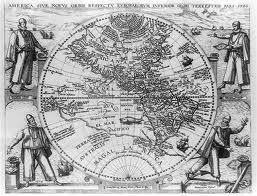**Test on Tuesday and Thursday this week**
Parents: This week's test will be over life in Colonial America. The students have a few different graphic organizers that they can use to study. The students will be tested on Tuesday and Thursday of this week. Tuesday's test will be over labeling the original 13 Colonies and telling me which colonies make up each region. Every student has a map that we made in class to use to study. Thursday's test will be the weekly test.
Students: Use this link to review your colonies. Click on each colony to see it's facts.
You can do activities and play games with the 13 colonies here.
Use this link to find out what life was like for children and for different workers in Colonial America.
*Next week we will begin reviewing for Posttest 1. It will be given the following week.
Notes for this week's quiz:
Why did settlers want to come to America? economic opportunity and religions freedom
What does religious freedom mean? the freedom to practice whatever religion you want
What is a self-sustaining farmer? a farmer who grows crops for himself
What is a cash crop? crops grown to make money
What is an indentured servant? a person who would work in exchange for a trip to the New World (usually working for 7 years)
What is a navigable river? a river that is deep & wide enough for a ship to get down
What is a plantation? a large piece of land that would include a farm, master's house, and slaves houses
New England Colonies: Massachusetts, New Hampshire, Connecticut, & Rhode Island
-thin, rocky soil that was not good for growing crops
-shipbuilding made the people of New England successful
-not navigable rivers
-self-sustaining farmers
-community minded (they took care of each other; distrusted outsiders)
-against slavery
Middle (Mid-Atlantic) Colonies: New York, Pennsylvania, New Jersey, & Delaware
-flat land that was great for farming; especially grains and wheat
-nicknamed "the bread basket colonies"
-navigable river that allowed them to trade with other regions
-people were open-minded
-people had religious and economic freedom
-against slavery and helped slaves escape the South
Southern Colonies: Virginia, Maryland, North Carolina, South Carolina, & Georgia
-flat land that was great for farming
-cash crops made the southern colonies successful: tobacco, indigo, & sugar
-navigable rivers
-people were close-minded and not willing to change
-people lived on plantations
-settlers imported slaves to work on the plantations
Sunday, September 25, 2011
Sunday, September 18, 2011
European and Native American Conflict
Parents: This week's quiz will be over all of the explorers we learned and a few questions about European and Native American conflict. We will be beginning to learn about the formation of the 13 Colonies this week.
Notes for this week's quiz:
(Use explorer notes posted last week)
How did Pocahontas help the colonists and Native Americans communicate? she translated for them
What did Europeans think they could find in the Americas? gold
What did the Europeans and Native Americans compete for? land
Native Americans had to teach the settlers how to _____________. grow crops
Notes for this week's quiz:
(Use explorer notes posted last week)
How did Pocahontas help the colonists and Native Americans communicate? she translated for them
What did Europeans think they could find in the Americas? gold
What did the Europeans and Native Americans compete for? land
Native Americans had to teach the settlers how to _____________. grow crops
Thursday, September 8, 2011
European Explorers
Parents: We have finished Native Americans and are now moving on to European Explorers. We will cover six different explorers over the next two weeks. Next week the students will be tested on basic information about each explorer.
*Every student has a graphic organizer with this information on it.
To learn more about each explorer click on their names.
Christopher Columbus , John Cabot, Juan Ponce de Leon, Vasco Nunez de Balboa, Jacques Cartier, Henry Hudson
Notes for this week's quiz:
Christopher Columbus:
-1492
-sponsor was Spain
-His purpose was to sail west to reach Asia.
John Cabot:
-1497
-sponsor was England
-He reached the eastern coast of Canada where fish were plentiful.
Juan Ponce de Leon:
-1513
-sponsor was Spain
-He wanted to find gold and the 'fountain of youth.'
-He ended up in Florida where the Native Americans were.
Vasco Nunez de Balboa:
-1531
-sponsor was Spain
-He was the first to cross Panama to reach the Pacific Ocean.
Jacques Cartier:
-1531
-sponsor was France
-He sailed over 1,000 miles down the St. Lawrence River in Canada.
Henry Hudson:
-1607
-sponsor was England
-He sailed up the Hudson River in New York, but his crew turned against him.
What did a sponsor do for the explorers? paid for their trips
*Every student has a graphic organizer with this information on it.
To learn more about each explorer click on their names.
Christopher Columbus , John Cabot, Juan Ponce de Leon, Vasco Nunez de Balboa, Jacques Cartier, Henry Hudson
Notes for this week's quiz:
Christopher Columbus:
-1492
-sponsor was Spain
-His purpose was to sail west to reach Asia.
John Cabot:
-1497
-sponsor was England
-He reached the eastern coast of Canada where fish were plentiful.
Juan Ponce de Leon:
-1513
-sponsor was Spain
-He wanted to find gold and the 'fountain of youth.'
-He ended up in Florida where the Native Americans were.
Vasco Nunez de Balboa:
-1531
-sponsor was Spain
-He was the first to cross Panama to reach the Pacific Ocean.
Jacques Cartier:
-1531
-sponsor was France
-He sailed over 1,000 miles down the St. Lawrence River in Canada.
Henry Hudson:
-1607
-sponsor was England
-He sailed up the Hudson River in New York, but his crew turned against him.
What did a sponsor do for the explorers? paid for their trips
Subscribe to:
Posts (Atom)


